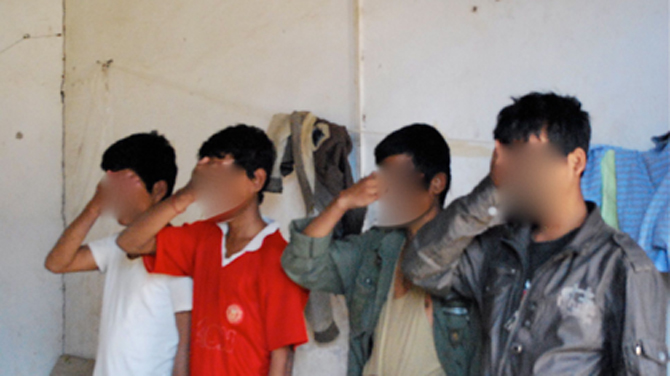Teenage Boys Tell of Forced Labor Horror

LAIZA, Kachin State—The Burmese army is using underage boys for forced labour and is coercing porters to fight on the front line against the Kachin Independence Army (KIA), according to accounts given to The Irrawaddy by four teenagers who say they served as porters for the army.
Two of the four are under 18; the others 18 and 19. The elder two say they were forced to march in front of the infantry as the soldiers approached KIA positions. All four say they were coerced into joining the Tatmadaw (the common name for the Burmese army) after being promised jobs by army officers at different locations and at different times during 2011.
Burma's government forces have long been accused of forcing civilians to work as porters and for using child soldiers in its campaigns against ethnic militias in the country's borderlands. According to January 2012 figures, since 2007 there have been 1,160 forced labour complaints registered with the International Labour Organization, which recently agreed with the Burmese government to renew its complaints process for another year.
Fighting between the Tatmadaw and the KIA resumed on June 9, 2011, after a 17-year ceasefire. Since then around 70,000 people, mostly Kachin villagers, have fled their homes due to fighting.
Aung Nan, aged 14, is the youngest of the four. “I was forced to go with the army to Kachin State on Sept. 9,” he said. “They stopped me one night after I had been watching a movie with friends in my hometown in Mon State.”
He says that he—along with three others who were also under 18—was woken at 4 am every day and forced to carry around 15kg of rice for the soldiers, sometimes marching until midnight. Aung Nan said he was beaten several times for failing to keep up with the soldiers, but that he was not forced to fight.
“Whenever we neared a village, everyone had run away before we got there,” he said, adding that he did not see soldiers kill or injure civilians.
“I escaped and ran away on Dec. 1,” he said. “We were passing through a banana plantation at Shadanpa [15 miles south of Myitkyina], and I told the soldier guarding me that I needed to go to the toilet. I ran through the forest as soon as I had a chance.”
Sitting nearby, Soe Htaik and Min Tin, age 18 and 19 and from Pegu and Irrawaddy divisions respectively, said they became friends while portering for the Burmese army last year.
“We were taken to work for the soldiers at different times,” said Soe Htaik. “But we stuck together, and in the end, we made a plan to escape.” Min Tin nods. “I was arrested in May last year,” he said. “We escaped together on Dec. 24.”
Both said they were forced to march ahead of the soldiers on two separate occasions as the Tatmadaw approached KIA positions.
“I was scared,” said Min Tin, adding that they were given guns before advancing on the Kachin fighters. “They taught us how to use the guns.”
Both said they never saw soldiers carry out attacks on civilians.
The interviews were conducted at a KIA intelligence base outside Laiza, a predominantly Kachin town on the Burma-China border, and a stronghold of the KIA's political wing, the Kachin Independence Organisation (KIO).
The interview with Aung Nan was arranged first, with the three others volunteering to be interviewed when The Irrawaddy requested additional accounts from similar victims.
The four youngsters were picked up by the KIA after they escaped and were taken to Laiza. They each said they have been well treated at the spartan KIO/KIA compound, where they are free to walk around the compound and sit in shaded chairs outside their shared sleeping quarters.
“It is better than I expected,” said Soe Htaik. “We were afraid at first of what the KIA soldiers would do to us because we were on the other side.”
The KIO/KIA told The Irrawaddy that the four teenage detainees are free to leave, however they fear arrest if they try to return to their homes.
One, Aung Nan, wants to remain in Laiza. “There are not many jobs other than farming in Mon State,” he said. “I think I can find a better paying job here, if there is peace, and the Chinese businesspeople come back.
“I don't want to go back to school,” he added.
Win Myint, aged 17, said he was forcibly recruited by the Tatmadaw on Jan. 1, 2011. He doesn't remember exactly when he escaped, but said “I left because I did not want to be a soldier.”
He said he wants to go home, but is unsure if he can. Despite being under 18, he said he is afraid he will be arrested, his fears partly based on rumors he has heard that army deserters receive 25-year jail terms if caught.
“We saw some of our friends die,” said Soe Htaik.
1 | 2 next page »
|
||
|
||
|
||
|
||
|
||
|
||
|
||
|
||
- 'My Wife Died From Police Abuse,' Says Husband
- US Says Observer Conditions Don't Meet Int'l Standards
- 159 Observers to Monitor Burma Election
- Govt to Address Breaches of SSA-South Ceasefire: Aung Min
- Burma Investors Pin Hopes on Seminal Sunday
- Malaysia PM Leads 50-Strong Delegation to Burma
- US Congress to Assess Burma's Political Prisoner Issue
- Rangoon Woman in Police Station Death Plunge
- Burmese Legal System Remains Tool of Govt: AHRC
- Burmese Army Chief Defends Political Role
